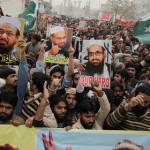Pakistan voted in general elections this week on July 25. The main parties, the Pakistan Muslim League-Nawaz (PML-N) and the Pakistan Tehreek-e-Insaf (PTI), will be locked in a predictably close fight. The difference this time is a dramatic rise in the number of religious political parties that have sensed an electoral opportunity, what with numerous corruption scandals plaguing the PML-N and the Pakistan People’s Party (PPP).
Religious parties have fielded 460 candidates for the National Assembly (NA), the highest in Pakistan’s history, according to the Election Commission of Pakistan (ECP).
Some of these parties were established by anti-India terrorist groups, like the Lashkar-e-Taiba’s (LeT) Milli Muslim League (MML). Once confined to the political fringe for their extremist views, they have now become part of the mainstream with the support of the Pakistan Army and the growing radicalisation of society, a project initiated during General Zia ul Haq’s regime in the 1980s.
The LeT and its Amir, Hafiz Saeed, were the first to be counted in when they set up the Milli Muslim League in August 2017. The ECP refused to register it as a political party. Undeterred, it has proceeded to contest the elections under the banner of another party, the Allah-o-Akbar Tehreek, by putting up 260 candidates. Saeed, the mastermind of the 2008 Mumbai attacks, who has a $10 million bounty on his head from the United States, is not standing for elections, but he has campaigned extensively, and his son, Hafiz Talha Saeed and brother-in-law, Khalid Waleed, two known operatives of the LeT, are in the running instead.
The Tehreek-i-Labbaik Pakistan (TLP), part of the Tehreek Labaik Ya Rasool Allah (TLY), a Barelvi group, has steadily gained prominence since 2015 for its demand to implement the Sharia as the law of the land. The organisation had successfully held ‘sit-in’ protests – with some help from the Pakistani Army – in November 2017 in Islamabad, forcing the resignation of the Federal Law Minister. This time, the TLP has fielded 187 candidates who have promised to create an Islamic welfare state.
Both the MML and TLP are threatening to usurp the voter base of the older ultra-conservative Muttahida Majlis-e-Amal (MMA), a political grouping formed in 2001-02. It consists of five parties, including the Jamiat Ulema-e Islam faction, headed by Maulana Fazal-ur-Rehman, once the most pro-Taliban politician in Pakistan.[1] The MMA has mobilised support from the electorate through campaigns on anti-India issues, such as ‘water jihad’ – accusing India of building dams to disrupt water supplies to Pakistan. Extremist outfits have taken frequent recourse to such rhetoric.
Yet another party, the Ahle Sunnat Wal Jamaat (ASWJ), successor of the proscribed organisation, Sipah-e-Sahiba Pakistan, responsible for most of the sectarian violence in the last five years, is deploying a different strategy. Unlike the MML and TLP, the ASWJ has quite openly aligned with the mainstream political parties by seeking support for its candidates in exchange for support of PTI and PML-N candidates, including former prime minister Shahid Khaqan Abbasi (PML-N), who is contesting from Islamabad.
Religious parties exerted a similar influence in 2001-02 when they had capitalised on the anti-U.S. sentiments in the backdrop of the ‘Global War on Terror’. The MMA had won a majority in then North West Frontier Province assembly and 63 seats in the NA. But factionalism has eroded its hold ever since. More recently, in the September 2017 by-elections for the Lahore National Assembly seat, the TLY and MML secured 11% of the overall vote to finish ahead of the PPP.
Ironically enough, extremist religious parties are assuming a place in the political mainstream just as the Financial Action Task Force placed Pakistan on its grey list for failure to tackle terror financing and money laundering. Pakistan’s 2018 elections are an important milestone in this development as the Pakistani army has executed it. The intention is to let these parties play a critical role in the next government’s formation – in the event of a hung NA – enabling them to bring their rabidly conservative, vitriolic and sectarian agenda into the domain of policy making.
China, Pakistan’s new benefactor, will be watching these developments keenly. The PML-N and PTI have lauded the China-Pakistan Economic Corridor (CPEC), even taking credit for bringing in its projects. But the religious parties’ position on it remains ambiguous, except for Hafiz Saeed’s, who has often accused the United States and India of sabotaging the CPEC. China is particularly concerned about the potential deterioration in the security scenario in the Punjab province, whose stability is crucial to CPEC’s success.
Sameer Patil is Director, Center for International Security and Fellow, National Security Studies, Gateway House.
This blog was exclusively written for Gateway House: Indian Council on Global Relations. You can read more exclusive content here.
For interview requests with the author, or for permission to republish, please contact outreach@gatewayhouse.in.
© Copyright 2018 Gateway House: Indian Council on Global Relations. All rights reserved. Any unauthorized copying or reproduction is strictly prohibited.
References
[1] The other four parties are Jamiat Ulema-i-Pakistan-Noorani, Jamiat Ahle Hadiat Pakistan (Sajid Mir group), Jamaat-e-Islami and Tehreek-i-Islami.


